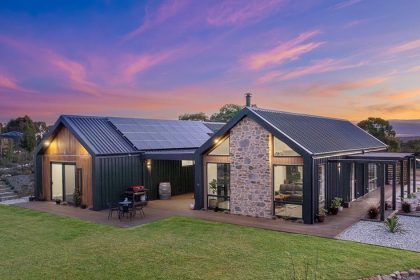A team of university researchers have called for more Australians to embrace renewable technologies to fight against the increasing threat of climate-caused power emergencies.
The University of New South Wales was tasked with exploring new energy resilience solutions to help provide the crucial capability of meeting power demands when the primary grid falters due to weather emergencies and bushfires.
Their report, funded in the wake of the black summer bushfires, found communities residing in disaster-prone regions can bolster their ability to manage climate-caused power outages by embracing other energy technologies, such as gas, solar and batteries.
The message comes as concerns of an El Nino weather event is set to bring dry conditions and increased temperatures to Australia this summer, with Australia already seeing an uptick in bushfire frequency compared to this period in previous years.
University of NSW Photovoltaic and Renewable Energy Engineering senior researcher Dr Mike Roberts said the loss of power during bushfires and other extreme weather events can be a great source of distress and vulnerability, leaving communities cut off from critical energy-dependent services and unable to meet basic needs.
“For many of these communities on the fringe of the network, there could be just a single line that connects them to the grid,” he said.
“If the line goes down during a bushfire, it can leave them without electricity from the grid for quite some time.”
Bushfires likely this summer
A Queensland Fire and Emergency spokesperson warned BuildIT that conditions were ripe for more bushfires due to past and predicted weather conditions.
“The prolonged period of wet conditions over the past three years has created a prime environment for vegetation growth across much of the state,” they said.
“The combination of drying fuels, forecast below average rainfall and above average temperatures are expected to increase fire activity across Queensland this season.”
“…We have already seen increased fire activity in the southern half of Queensland.”
Policy support needed to boost uptake
Report author and School of Humanities and Languages professor Dr Sophie Adams said the findings underscore the urgent need for policy support that empowers households to harness alternative energy resources, increasing community safety in the face of weather adversity.
“The resilience of energy systems is a matter of growing concern as we are set to face more frequent and intense fires and severe weather events because of climate change,” she said.
“Building energy resilience in bushfire-affected communities can be a matter of life or death, given the dependence on electricity for telecommunications, water, fuel, money, and refrigeration.”
In addition to the report, the research team has produced a guide to backup power options for resilient households.
This will help those in areas likely to be affected by disruptions consider how they can best maintain energy supply during grid outages, with options such as solar and batteries enabling households to generate, store and use energy when the grid is offline.
“The tendency to frame the value of renewable energy systems like solar in purely economic terms such as payback periods is quite narrow,” Dr Adams said.
“We should take a more comprehensive view of distributed energy resources value, to include not only bill savings and emissions reductions but also resilience-building capacity.”
Relying on electricity could put homes at risk
Dr Adams warned an over reliance on electricity as a result of well-intentioned carbon-friendly climate change solutions could inadvertently hinder the power resilience of bushfire-prone communities.
“Electrification of communications, transport, cooking and heating and more is necessary, but may have unintended resilience impacts,” she said.
“The need for backup electricity supply in these areas vulnerable to power outages needs to be included in the discussion of ongoing decarbonisation.”
To download the report in its entirety, click here.







